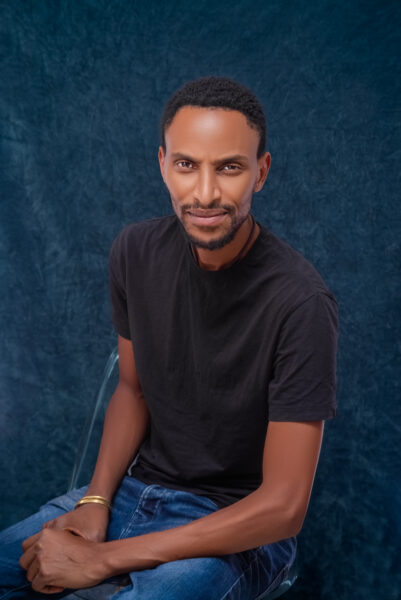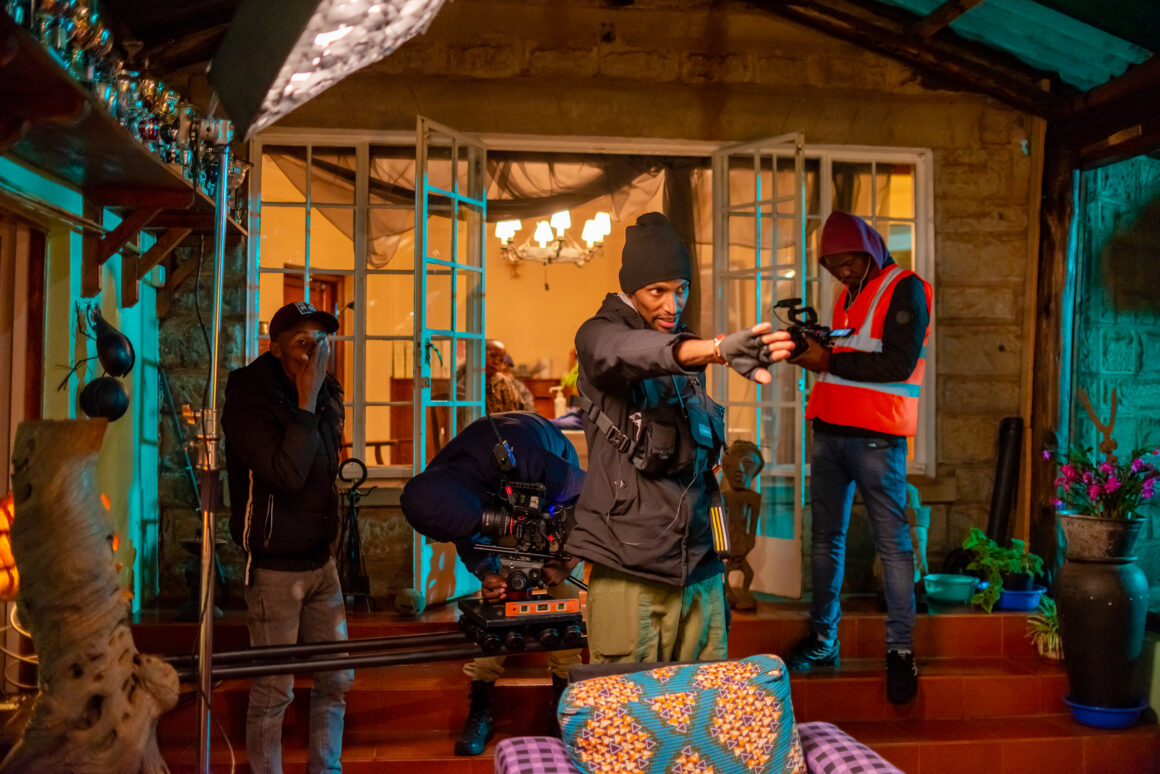Kenya is by far the economic and creative economy hub of East Africa, according to an article published by The Business Daily. Kenya’s creative sector contributes 5% to the national GDP, making it not only a source of jobs but also a beacon of innovation. The article also cites a 2016 MSME (Micro, small, and medium enterprises) survey indicating that businesses in the Arts, Entertainment, and recreation sectors have the highest average lifespan of 10 years compared to businesses in other industries. Does this mean that the creative sector is a lucrative space to be in? We interviewed three Kenyan creatives to hear their take on the burgeoning creative economy.
Gregory Kiwo (Filmmaker)
Gregory Kiwo is a Kenyan filmmaker (Gaffer) who has been working in the film industry for over 10 years. He is a two-time Kalasha Award winner for best lighting (2014 & 2017) and has also won awards for best short film at the Machakos Film Festival for best cinematographer and best art & design for his film ‘Solo.’
In the last few years, Gregory has morphed into creating his own films, such as the short film ‘Solo,’ the feature film ‘Checkmate,’ and most recently, ‘Thief.’ These are the films he has done, not in the capacity of a Gaffer, but more to explore his creative side.
Please share your journey into filmmaking & what inspired you to pursue this career.
I stumbled into film, it wasn’t my first career choice. I never dreamt of being in the film industry, my career choice for the longest time was to work in the aviation industry. I wanted to be a Pilot, so getting into film was accidental. I ended up doing Journalism which got me closer to film. While studying journalism, I found myself gravitating more towards photography and videography.
It was a friend of my Dad who introduced me to the world of TV and that’s where I met my very first mentors Kiseu and Kimaita. They had a production company called KenTV and at the time, we were shooting a series called ‘Tabasamu’. That’s where I got to hone my skills and that’s how I got my footing into the world of film& TV.

Since then, I have had several mentors who have held my hand throughout the years, the likes of Alphie Mgendi, Walter Odhiambo, Wafula Chasimba, Chris Rohio, and Francis Ouma. These people taught me the ropes in different capacities. I didn’t get into lighting right away. In the beginning, I was a set runner. My job was basically doing everything on set, from slating to doing a bit of sound and camera work. I was an assistant to everyone, and that’s the best way to learn when you are on set because you get a feel of different departments and you get to discover what you like as well as what you don’t like.
I eventually got trained in sound, camerawork, art and finally lighting. The reason why I fell in love with lighting is because most of the decisions that are made on set are done through light. Any genre of film or piece of visual always starts with mastering lighting. Lighting dictates the mood, tone, and overall look and feel of a film.
What I love most about what I do is that I get to meet and interact with a lot of creative people. Film also offers me the opportunity to travel and discover various destinations. In terms of the lows of this profession, the waiting time for payment is off-putting. Some projects take way too long to pay after completion.

Filmmaking is a promising career, it’s a profession that can be learned easily and it’s a very lucrative career path, you can earn a decent living through it. I would encourage anyone interested in this career path to go ahead and pursue it with passion.
- Gregory Kiwo -
What do you believe is the role of the film industry in shaping & driving the Kenyan creative economy?
Film is a business like any other and there’s money to be made in film. When we make movies, we get to showcase our country to the world. We are essentially marketing Kenya as a tourism destination and I believe that somehow contributes to the Kenyan creative economy.
What role do film festivals & screenings play in promoting the Kenyan film industry both locally and internationally?
They play a big role, especially in marketing the country as a tourism destination. When our films are viewed internationally through these festivals, people get to discover different parts of our country, and that promotes tourism which in turn generates income for the country. Locally, film festivals and screenings help to create more buzz, enticing more people to watch and love our stories.
What impact do you think government policies and support have on the growth of the creative economy in Kenya?
The support of the government is extremely important in growing the creative economy. The biggest hurdle to making films is always finances and so with the right policies in place and through the various incentives and funds that the government offers, it becomes a little easier to create because you have financial backing and support from the government.
Do you think filmmaking is a promising career and what advice would you give to aspiring Kenyan filmmakers?
Yes! Filmmaking is a promising career, it’s a profession that can be learned easily and it’s a very lucrative career path, you can earn a decent living through it. I would encourage anyone interested in this career path to go ahead and pursue it with passion. Don’t put hurdles in front of yourself, start small and continue growing. Keep showing up, keep telling those stories, and you will definitely go places.
Aisha Wanjiku (Media Personality)

Aisha is a seasoned Kenyan media personality who wears many creative hats! As a broadcast journalist, she keeps audiences entertained on both TV and radio, hosting shows on K24 and Radio Milele, respectively. She also loves fostering in-depth discussions on sexual & reproductive health (SRH)/women-related topics as one of the hosts of Space Yako The Podcast. In addition to on-air work, Aisha leverages her creativity as a Reality TV Content Director.
Please share your journey in media & what inspired you to pursue this career.
My sister is the one who initially applied for me to study Mass Communication but stepping into that classroom for the first time is what solidified my calling. My naturally outgoing personality made perfect sense in this field. Fast forward to today, I’ve had the privilege of hosting top-rated shows, with ‘Gani Kali’ on Maisha Magic being a particular highlight.
Of course, the journey hasn’t always been smooth sailing. Finding my voice and personal brand within the media industry was a little challenging at first, however, I’m proud to say I have been able to establish myself as an eloquent Swahili entertainment presenter.
One of the challenges of being in the creative industry is the lack of minimum wage for talent. This brings about exploitation, unfair contract terms, long working hours without overtime pay, and difficulty in negotiating for better pay. These issues easily demoralize talent.
We need initiatives that focus on equipping creatives with digital skills and mentorship as well as programs that provide funding options like grants. We also need to strengthen policies on intellectual property to fuel innovation and empower creators.
- Aisha Wanjiku -
How does media play a role in promoting and shaping the creative economy in Kenya?
Media acts as a bridge between Kenyan creatives and the public by promoting talent, building the market, and nurturing the creative ecosystem.
Can you discuss the role of local content in Kenyan media and its influence on the creative industry?
Local content is the heartbeat of Kenya’s creative industry. It sparks creativity by drawing on Kenyan experiences, fuels the economy by creating jobs and attracting audiences, and builds Kenya’s soft power through global recognition and national unity.
Despite the various challenges that crop up while creating localized content, there’s no denying that local content is crucial for a flourishing creative scene in Kenya.
How do you use your platform to support and elevate emerging Kenyan artists and creatives?
I do this through the TV and Radio shows that I host. I always invite various artists and creatives for interviews, I play their songs on my radio show and I also create awareness about emerging creatives by sharing and talking about them on all my social media platforms.
What initiatives or programs do you think could further support and grow the creative economy in Kenya?
We need initiatives that focus on equipping creatives with digital skills and mentorship as well as programs that provide funding options like grants. We also need to strengthen policies on intellectual property to fuel innovation and empower creators.
Nzilani Kimani (Makeup Artist)
Nzilani is a renowned Kenyan Makeup Artist and Beauty Educator who has been redefining beauty standards and setting trends in the creative industry. With over a decade of experience in the industry, she teaches women how to look beautiful and how to show up for themselves. She also owns a studio where she specializes in permanent makeup, such as microblading.
How has the makeup industry in Kenya evolved over the past decade, and what key factors have driven its growth?
The Makeup Industry in Kenya has definitely evolved, it’s not the same as when I started. I started my makeup career almost a decade ago and back then, we didn’t have YouTube or all these platforms where people can learn how to do makeup and how to pursue it as a career. I remember when I started doing it, even my husband couldn’t understand.
But now with the way technology is advancing, the industry keeps growing and people are more open and have embraced looking good. You don’t just have to get makeup done on you only when you are getting married. I love that the industry has grown, and the more social media grows, the more the makeup industry in Kenya grows as well.
What advice would you give to aspiring Makeup Artists in Kenya who want to make a name for themselves in the creative economy?

I would advise them to first invest in their work. Make sure that you are consistently growing because makeup artistry is a skill, and you need to continuously hone that skill. Practice your artistry, ask your friends or relatives if you can practice on them, and then post that work. Another thing I would advise is to consistently make sure that you are posting good-quality images and videos.
You don’t necessarily need to invest in a camera for this, you can take the pictures and videos on your phone. Just make sure that someone is angled where there is great light. Avoid the temptation to over-edit your images/videos or to post work that is not yours.
Also, collaborate with people in the industry. I know we are all against this whole issue of working for exposure but sometimes, that’s how you get your name out there. If you are consistently working on your craft, consistently posting, and consistently learning how to collaborate and work with people in the industry, then you will definitely grow.

Kenya’s Creative Economy is burgeoning, offering a myriad of opportunities in fields such as arts, entertainment, culture and digital innovation. If you are passionate about these areas, perhaps you can consider how quiet quitting might allow you to explore a new, fulfilling career path within this dynamic sector.

